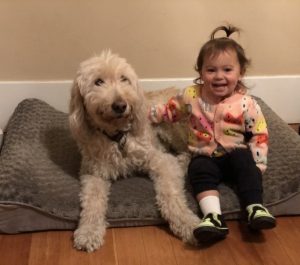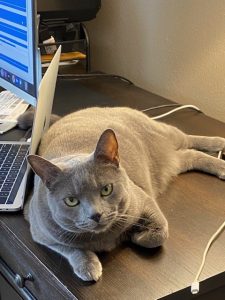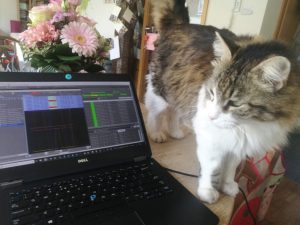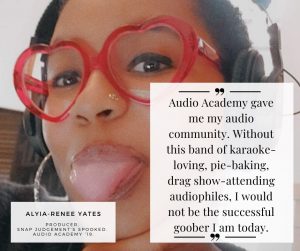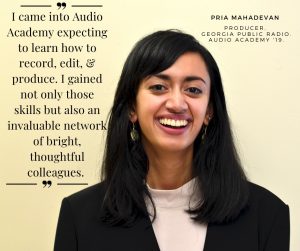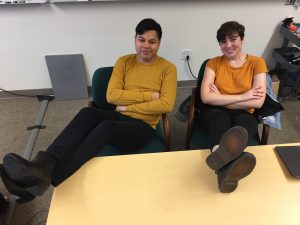ACE Spectrum
ACE Spectrum
Ace Spectrum is about you — the ACE Learning Centers.
It’s a quick sharing of ideas, inspiration, opinions and best practices among our continuing education organizations.
Please join the conversation.
Perfect Timing for National Poetry Month Because Poetry Helps Us Process Emotions
By Riley, ACE Poetry Contest Mascot, assisted by Martha Sessums, ACE President, who is about to give up on keeping dog paw prints off her keyboard*
Hi, it’s Riley. I’m back. That catbombing can be fun. I was actually taking some of the Poetry Cats’ advice and hung out in a cardboard box for a while. It felt like I was in charge of my own personal space, powerful Dog Ruler and all. But then I missed Lucy and John and realized that being stressed, sad or fearful in these shelter-in-place times is normal, so hanging out with family is important.
You know what’s weird? Sometimes I don’t want to be cheered up. I just want a support hug that says it’s okay not to feel okay. Because someone telling me all the time it’s going to be fine doesn’t seem honest. I miss seeing my dog friends and neighbors, getting in the car and going to the beach or park and not worry about getting too close. I also see John work hard to ensure that distance education for Alpha Public School’s students and teachers is working. (Arf, arf! Lots of thanks to this frontline educator team and all the ACE Learning Center schools who are doing a great job with distance learning.)
So, when I’m sad, poetry’s a great distraction. In fact, National Poetry Month came at a great time. Reading poetry is not only entertaining, it can help process emotions. Emotions like being sad, or frustrated, or bored and unmotivated, even fearful of the future. Or angry and helpless that all this is happening to me, my friends and family.
One poem that Lucy and I share is Still I Rise by Maya Angelou. Here’s my favorite part:
You may shoot me with your words,
You may cut me with your eyes,
You may kill me with your hatefulness,
But still, like air, I’ll rise.
That’s what Lucy and I do. I rise when Lucy comes in the room to say hello. Lucy gives me pets in return. I respect her as a smart girl, and she respects me as a fuzzy, poetry-loving dog. This poem says we’re strong and we’ll will rise above all the bad stuff out there.
Another Poetry Cat advice for distance learning was to “be there.” That kinda means showing up. We each have our dreams and it’s up to each of us to hang on to them.
Arf, arf, the hanging on part is hard. So much gets in the way. It’s easy to say hang on when so much has changed because of this lousy virus. You students are faced with a lot. With job closures, money is scarce for buying dinner (much less dog treats.) It’s hard to speak up in an on-line class and it’s frustrating with no one to talk to about the homework assignment. And where’s help for passing tests and figuring out how to get into college? You students are faced with a lot and I suspect lots of dreams seem impossible now. (Remember – the teachers and counselors at your schools are there to help.)
But even dogs have dreams, and here’s a poem I share with Lucy when I dream of going out to the park to run and play with her – and I can’t right now. It helps both of us process our emotions.
Dreams
By Langston Hughes
Hold fast to dreams
For if dreams die
Life is a broken-winged bird
That cannot fly.
Hold fast to dreams
For when dreams go
Life is a barren field
Frozen with snow.
Reminder: tomorrow, Thursday April 30, is Poem in Your Pocket Day. I’ll be sharing poems in my pocket (well, Lucy’s pocket) so that will be fun. And then look out for the poems of the ACE Poetry Contest winners.
Lots of treats are coming, but today, treat yourself to a poem.
*I treated Martha’s keyboard with some paw prints today. Arf.
We’re Catbombing the ACE Poetry Contest Again ‘Cause Cats are the Best at Distance Learning
By Poetry Cats, who sent in their blog copy via Google Docs so Martha’s keyboard stays clean, ‘cause Riley really messes it up
Here we cats are – playing around with poetry again. It’s the last week of National Poetry Month and nearing the end of the ACE Poetry Contest, so we wanted to get our paws back in.
You students are doing still doing distance learning and we’re here to help. In fact, we cats are good at distance learning. Mostly the distance thing, as learning is not one of our favorites, but that doesn’t mean learning isn’t important. For you human students, it’s real important. So we cats have some tips.
1. Curl up in a cardboard box when you feel like it.
Sometimes you need your own space. Take it.
2. Support your classmates and your teacher
It’s like giving a cat a pet or a scratch behind the ears. We love that and will purr in return. It’s a great support system. Just ask Graciecat who helps her friend Diane by hanging with her by the computer. Supporting each other.
3. Be there
Attend classes. Do the homework. It’s about you, no one else. You are the star. Sorta like Sparklecat who helps with the NASA engineers. Just keep trying. Be there for yourself, your family and your education. Sparklecat has learned that NASA commands require using a “mouse” and while we cats prefer live mice, we suspect Sparkelcat is working on using a computer mouse. We have liftoff, Sparkelcat!
4. We’ll get through this and be better
Distance learning is hard. That’s why cats, although good at being distance, actually like to hang with students who are looking at screens. Probably because we don’t really like being ignored unless it’s on our own terms. But distance part is hard. Just like virtual pets and scratches behind the ears suck. But this is the new school experience now, and we’ll get through this together and be better for it.
We Poetry Cats have to end this blog with some catteral poetry. We have a special friend at ACE – Ron Loiacono who is on the ACE Board of Directors. His poem was inspired by Sarahcat and it meets our high standards for catteral poetry.
My Confused Body
My Brain says that I can run a four-minute mile
My Heart and Lungs say that the Brain is hallucinating
My Bladder says are we there yet?
Another side of me says it’s snack time somewhere ?
For we cats, it’s always snack time. But it better be a good snack.
Riley has asked that we remind everyone that this is the last week for National Poetry Month and that April 30 is Poem in Your Pocket Day. We cats don’t have pockets, but pets and ear scratches count as poetry for us.
Stay tuned for poetry from the winners of the ACE Poetry Contest from all the ACE Learning Center schools. Meow.
Time’s Running Out – Apply Now for KALW Audio Academy 2020-21
By Ben Trefny, News Director, KALW, Audience Supported Public Media and Julia Llinas Goodman, Audio Academy Fellow
Quick note to start with: KALW is accepting applications for our next Audio Academy class through Sunday night! Apply here! Want to see what an extraordinary experience it is? Check out these testimonials:
Looks great, right? Apply now!
In the seven years that we’ve been operating our Audio Academy with support from ACE, this has generally been one of the most exciting times of year. That’s because we’re in month seven of our nine-month training program, and that means our Academy fellows have largely built the skills to make high quality feature stories.
Well, as you are very aware, this is a year unlike any other year. But our Audio Academy fellows are producing more than any class we’ve previously had. As I noted in a previous blog post, everyone is producing a spot story for regional broadcast during Morning Edition and/or All Things Considered every weekday. And they’re starting to knock out features on a regular basis as well.
This week, Julia Llinas Goodman made a story drawing parallels between the reality show The Circle (in which competitors could only communicate through social media) and our current reality during the coronavirus crisis. Check it out right here.
I asked Julia to write up some of their thoughts about reporting in this time. Here’s what they had to say:
It was the fall of 2016, and I was huddled around the television with a group of my coworkers, watching Donald Trump be elected president. It was my first job out of college, and I was a research assistant at a small newswire service. As the night grew later and the odds of Trump winning grew ever more certain, I watched my colleagues who didn’t have stories to update leave the room one by one, shaking their heads in defeat. It felt like something had changed about our office, about the work that we were doing as journalists. For some of us, the change was unexpected; for others, the change was a heightening of issues we had been struggling with for a long time. Could those issues be improved by writing about them, by investigating them as thoroughly as we could and reporting them to the public as honestly as we knew how? I hoped that they could.
More than three years later, we face another major shift in the journalistic landscape. This one is more complicated — there’s so much we don’t understand about its source, its method of spread, and how to protect ourselves. And at times, it feels even less likely that anything we’re doing as journalists right now can matter. We’re all being challenged in new ways, and just getting through each day presents another set of obstacles to be overcome.
In the Audio Academy, we’re journalists, but we’re also students — the lessons we’re learning now will impact how we tell stories for years to come. One of the projects I’ve been focusing on at KALW during this time has been our “Quarantine Diaries” series. I interview rideshare drivers and other freelance workers about the struggles they’re facing during these uncertain times. Sometimes, I feel indescribably guilty that I can’t do more to help, that telling their stories and passing along links to apply for mutual aid resources or unemployment is the most I can do. At other times, I think about how I and many of my classmates in the Audio Academy have been laid off from our paying gigs during this time. I feel what can only be described as a crushing sense of doom at the sheer number of people facing financial, medical, and emotional crises right now — often, all three at once.
Yet, at the same time, I’m watching the people I live and work with step up in incredible ways, ways I couldn’t have predicted before this pandemic started. My coworkers are giving their every ounce of free time and mental stability to covering the news, to making sure people understand the full scope of the human impact of this crisis. My neighbors are risking their health and safety to help each other. People are acting in frustrating and horrifying ways, but they’re also acting in amazing and inspiring ways.
Much like the rest of the world, it’s hard for me to predict how this sudden change will impact me in the long term — either as a student, a journalist, or a person. But one thing I still believe is that investigating the truth, and telling stories about it, is a vital tool in times of crisis. We need to hear from each other now more than ever, to feel connected to something larger than the limits of our own homes. In some ways, I couldn’t have picked a luckier time to be working alongside some of the most dedicated reporters and storytellers I’ve ever met. It feels like a gift to be able to do some small thing to help my community survive all of this.

